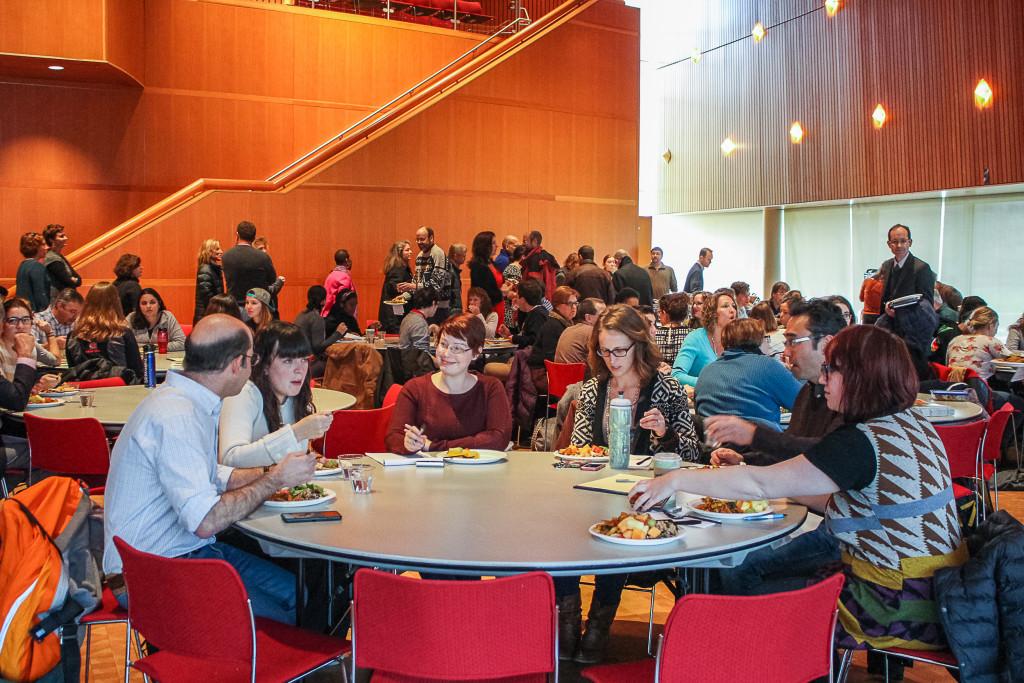Lily Bohlke
bohlkeli@grinnell.edu
“We’re looking to help students thrive, not just survive,” said SGA Vice President for Student Affairs Dixon Romeo ’16 in his opening remarks at this week’s town hall focused on students’ well-being.
Wellness and Prevention Director Jen Jacobsen and Romeo organized the event and developed a structure different from typical town hall meetings in order to foster discussion among the students, faculty and staff present. Mixed groups were seated at tables with one person in charge of taking notes. Jacobsen and Romeo presented data from the ACHA-National College Health Assessment and facilitated both small and large group discussions.
Before they began, Jacobsen stated the importance of recognizing the environment of the College when this survey was taken. The school was in the midst of the Yik Yak scandal, in which hateful posts targeting black students and victim-survivors of sexual assault caused the College to remove Yik Yak from its servers. Additionally, The Huffington Post had recently released an article which cited problems the College had while dealing with sexual assault on campus.
“That might help set the stage for what students were thinking about when taking the survey,” Jacobsen said.
Jacobsen and Romeo went on to outline some of the major reasons students reported a lack of well-being and the academic impact these causes may have. These main categories included lack of sleep, alcohol use, marijuana use, tobacco use, non-medical prescription drug use and bias and discrimination.
According to the survey, less than five percent of the College’s students get enough sleep to feel well rested in the morning consistently.
In small groups, students, faculty and staff went on to discuss potential contributors and barriers to getting good sleep. Students talked about time management, college culture and “quiet” hours among other reasons why many students do not get enough sleep.
“One barrier our group talked about was the lack of good communication or establishment of quiet hours on the floor,” said Lukas Resch ’19.

On the subject of alcohol, the survey showed that 44 percent of students at the College reported other people’s alcohol use has impacted their ability to study and 61.4 percent of students reported it has impacted their ability to sleep.
“This was asked as a yes or no question, so there’s a lot of nuance in this question,” Romeo said. “This information might be a lot more valuable if we could get more breakdowns about if it was a repeated incident, what day of the week was it.”
After discussing at tables the impacts of alcohol use on the community, SGA President Dan Davis ’16 said that using alcohol can be relaxing and a community-building activity,
whereas other participants felt that alcohol use creates a social gap between students who are substance-free and students who use substances.
“Some events on campus are really substance-centric, creating an inadvertent disconnection between members of the community,” said Keegan Davis ’18.
The next matter of discussion was marijuana use. The survey suggests a statistically significant relationship between marijuana use and depression, anxiety and sleep difficulties.
“Mental health and substance use are not always separate,” Jacobsen said. “It’s concerning to me.”
Tables discussed why students may or may not choose to use marijuana. One of the main arguments was that on campus, many students perceive marijuana as helping them relax or sleep, according to Davis.
“People think they are functional while they’re using marijuana,” Davis said. “People think, ‘Oh yeah, I can smoke a spliff and bang out a 10-page paper. I’m so cool.’”
After briefly looking at statistics on tobacco use and non-medical prescription drug use, the focus was brought to the final section, bias and discrimination. The discussion topic of this portion of the town hall was about what information should be collected.
Selah Mystic ’19 spoke about how helpful it would be to know where instances of bias and discrimination occurs on campus most often, whether it be in dorms, in classes or anywhere else. She also reflected that the types of bias are important to identify.
“If a person has felt they have been discriminated against, it’s important to note whether someone explicitly said something racist or if it was mostly micro-aggressions,” Mystic said.
Jacobsen concluded by announcing that a follow-up to the conversation on well-being will be held in February.


































































